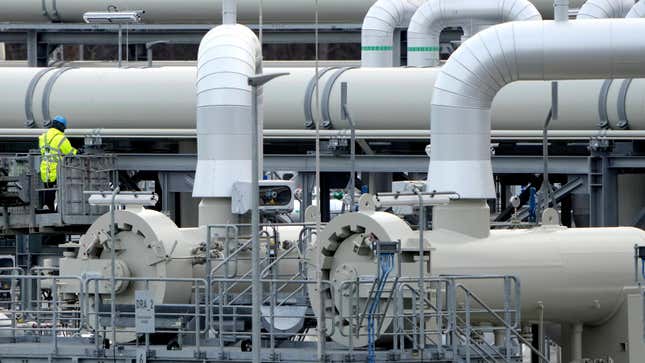
German officials said Tuesday that they would block the Nord Stream 2 pipeline, an enormous project that would double the flow of Russian natural gas into the country. The announcement comes in response to the ongoing conflict between Russia and Ukraine.
“In light of the most recent developments we must reassess the situation in particular regarding Nord Stream 2,” German Chancellor Olaf Scholz told reporters at a press conference.
The 750-mile (1,200-kilometer), $11 billion pipeline was first announced in 2015 and completed last fall, but it has yet to get the final approval from regulators that would bring it online. The pipeline runs from the coast of Russia under the Baltic Sea to Germany and has the capacity to transport 55 billion cubic meters of gas per year—which works out to more than half of Germany’s total annual energy requirements, CNN reported.
The environmental impacts of the pipeline are significant: The NGO Environmental Action Germany claims it will emit some 100 million tons of CO2 per year, plus fugitive methane releases—a huge concern, given how potent a greenhouse gas methane is compared to CO2.
The Nord Stream 2 project has faced serious pushback from world powers, not for its climate impacts but rather for how it could boost Russian influence. The pipeline’s owner, Gazprom, is Russia’s state-run oil and gas company. Powerful countries including the U.S., as well as countries in Russia’s direct orbit, including Poland and Ukraine, CNBC reported, have worried that the pipeline will boost Putin’s influence. (The U.S. oil industry, which is also eyeing European markets for its products, has also campaigned heavily against the pipeline.)
Germany has publicly held for years that, contrary to some of its allies’ worries, Nord Stream 2 is solely a financial venture. But Germany has increasingly been dragged into Russia’s geopolitical conflicts as the pipeline’s existence escalates tensions.
“By requesting the halt of Nord Stream 2 certification process the German government takes Russian gas exports back from the administrative-regulatory sphere where it tried to put it in the last couple of years, to the realm of geopolitics,” Maria Pashtukova, senior policy advisor of energy diplomacy at E3G Berlin, said in an emailed statement. The move, Pashtukova said, shows “there is a geopolitical price tag that comes with cheap Russian pipeline gas, and it is very high.”
Europe currently relies heavily on gas from Russia—about 35% of the whole of the EU’s natural gas supply is from Russian sources, Reuters reported. As energy prices soar this winter in the EU thanks in part to low natural gas inventories, bad weather, lower supply from Russia, and increased economic activity, the prospect of shutting off a huge potential new source of energy may seem daunting to some. Putin, for his part, last fall tried to blame Europe’s energy problems on the renewable energy transition, blasting renewables as “erratic” sources of energy. (Analysts said Tuesday that the EU now has enough gas supplies to last until the spring, when energy use usually drops.)
But experts note that European energy markets were vulnerable to the whims of Russian supply even before renewables became significant players on the grid. In the long term, speeding the transition to renewable energy can help protect countries from relying on problematic powers for fuel.
“The whole idea that Europe wouldn’t be in this mess if it wasn’t for the energy transition, that’s crap,” Samantha Gross, director of the energy security and climate initiative at the Brookings Institution, told InsideClimate News. “More renewables actually insulates economies from problems like these. It doesn’t cause them.”